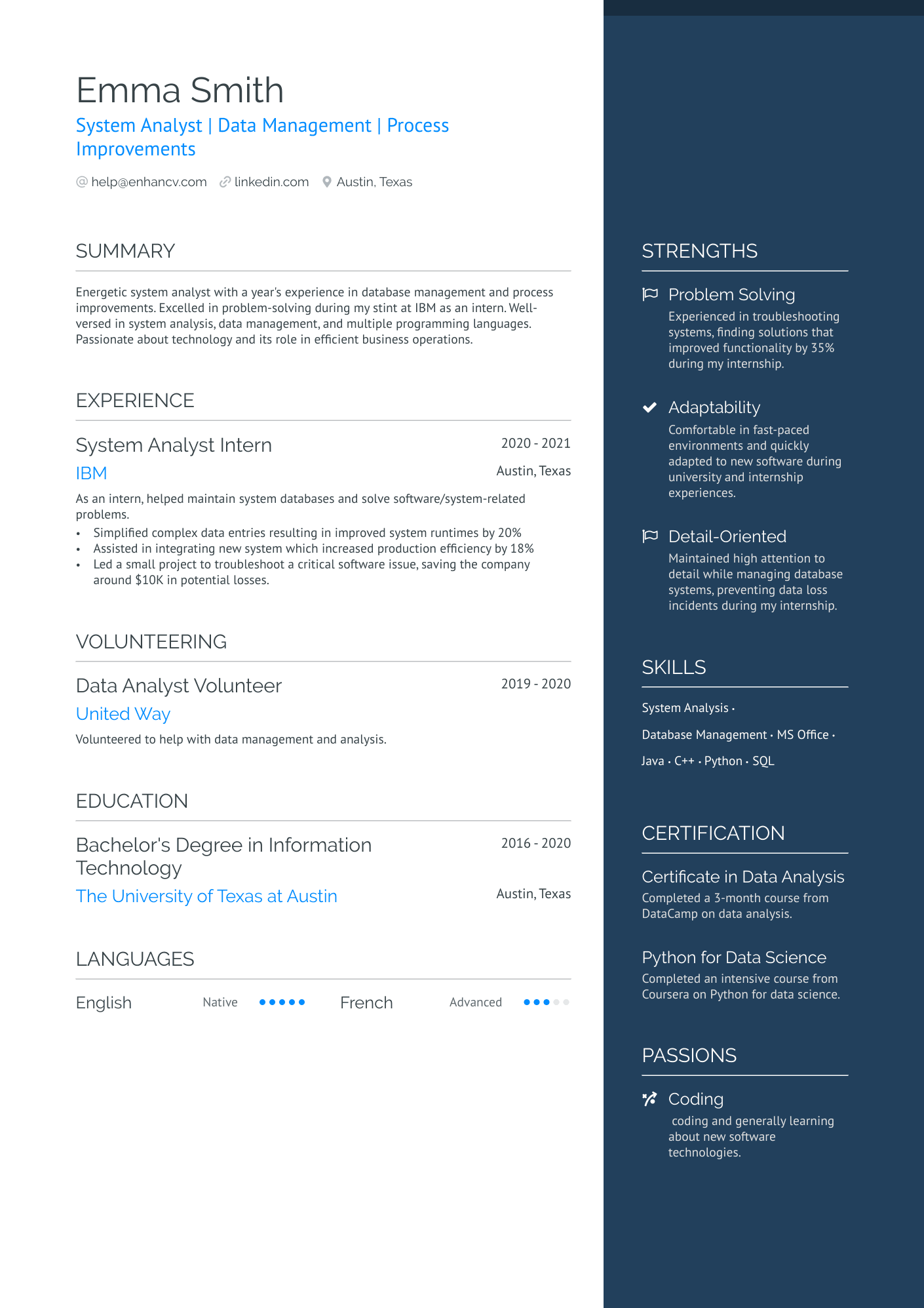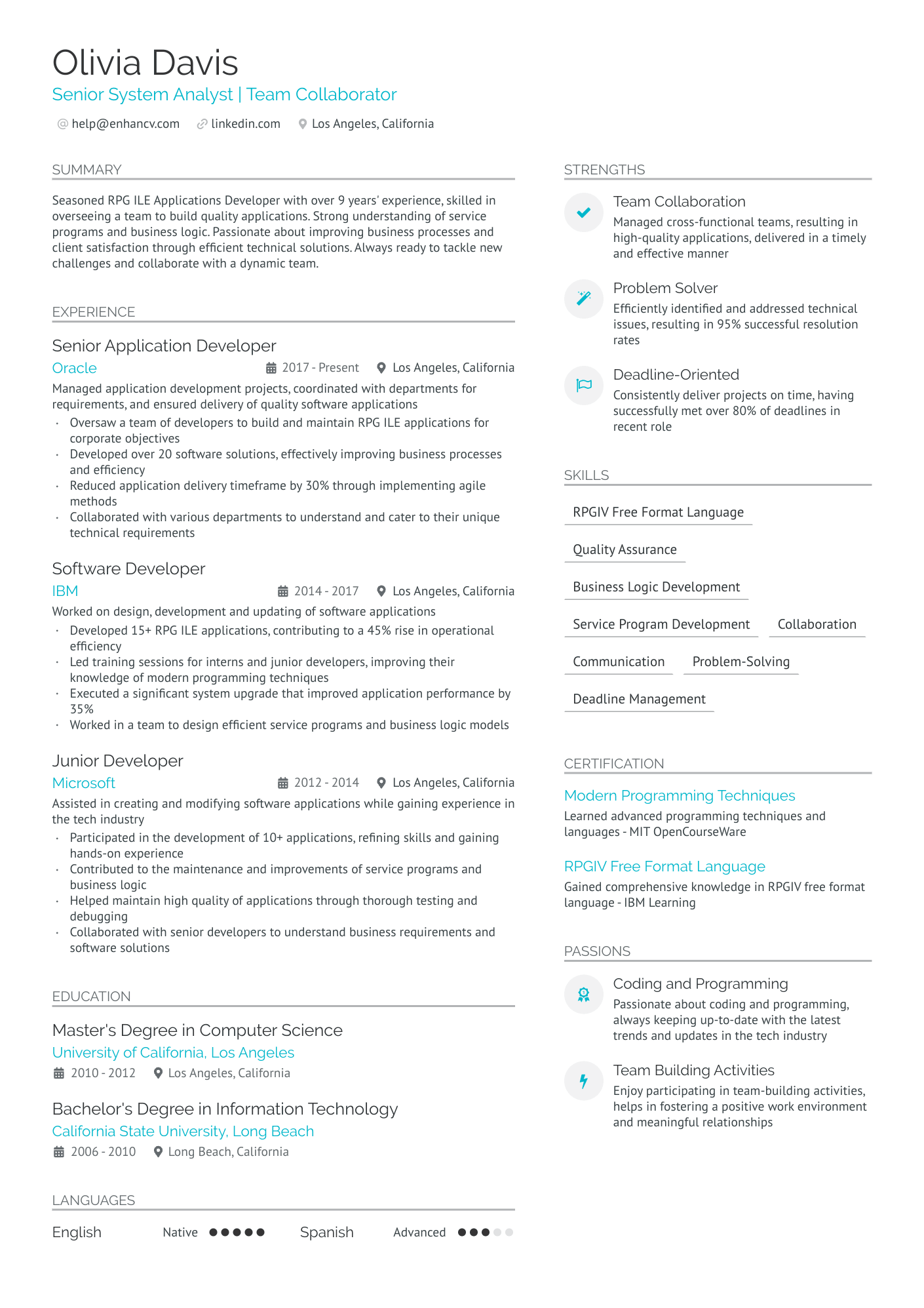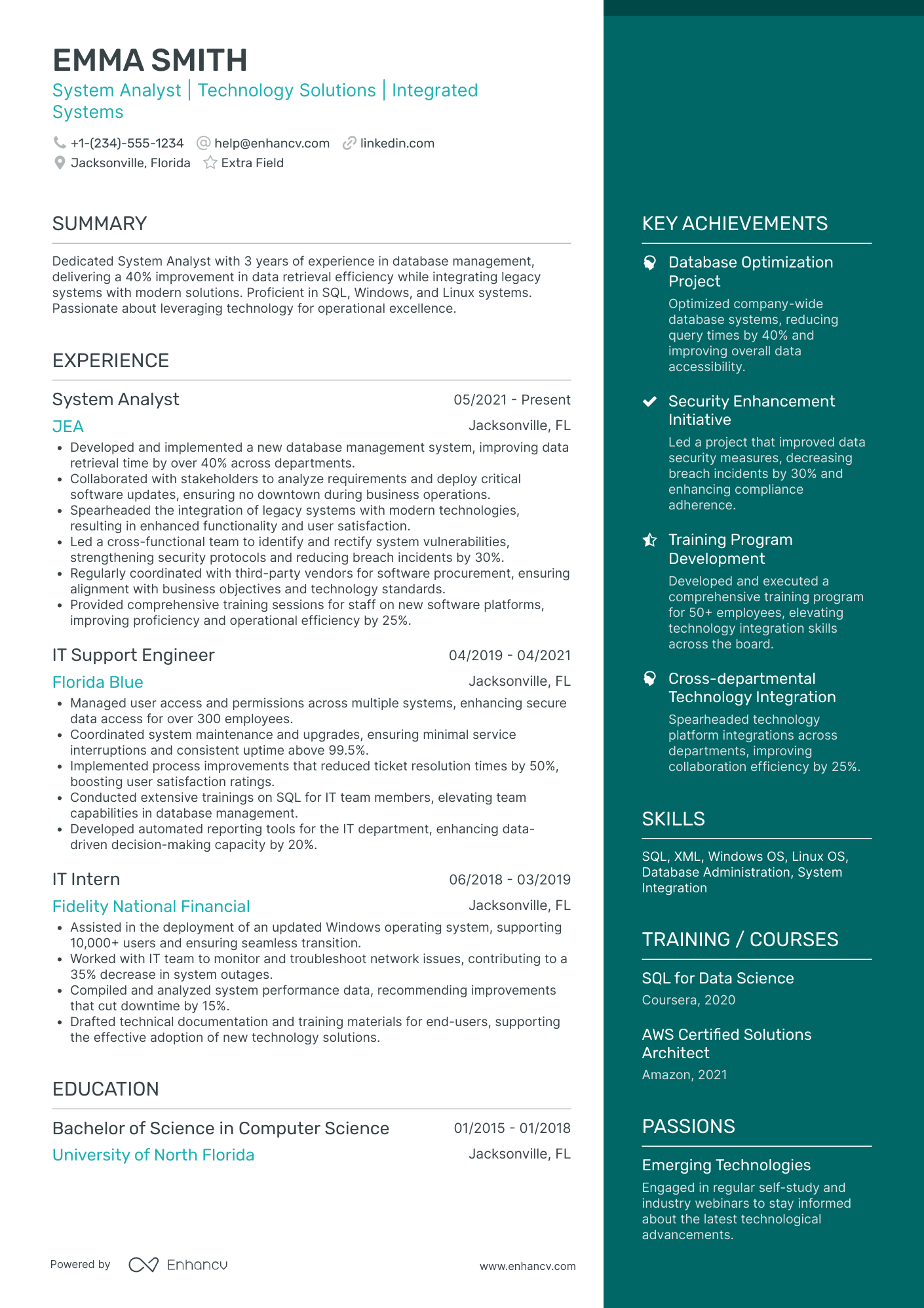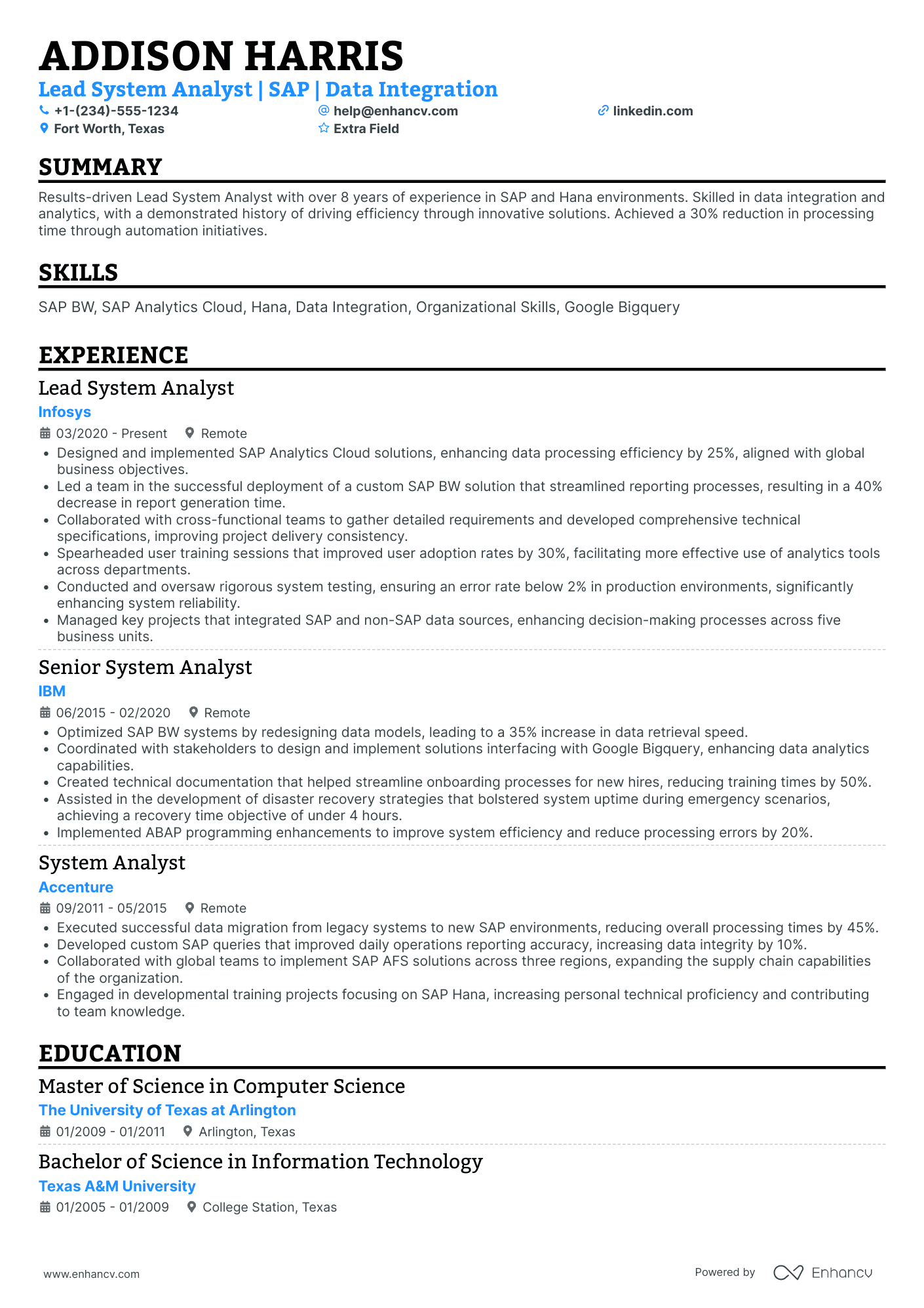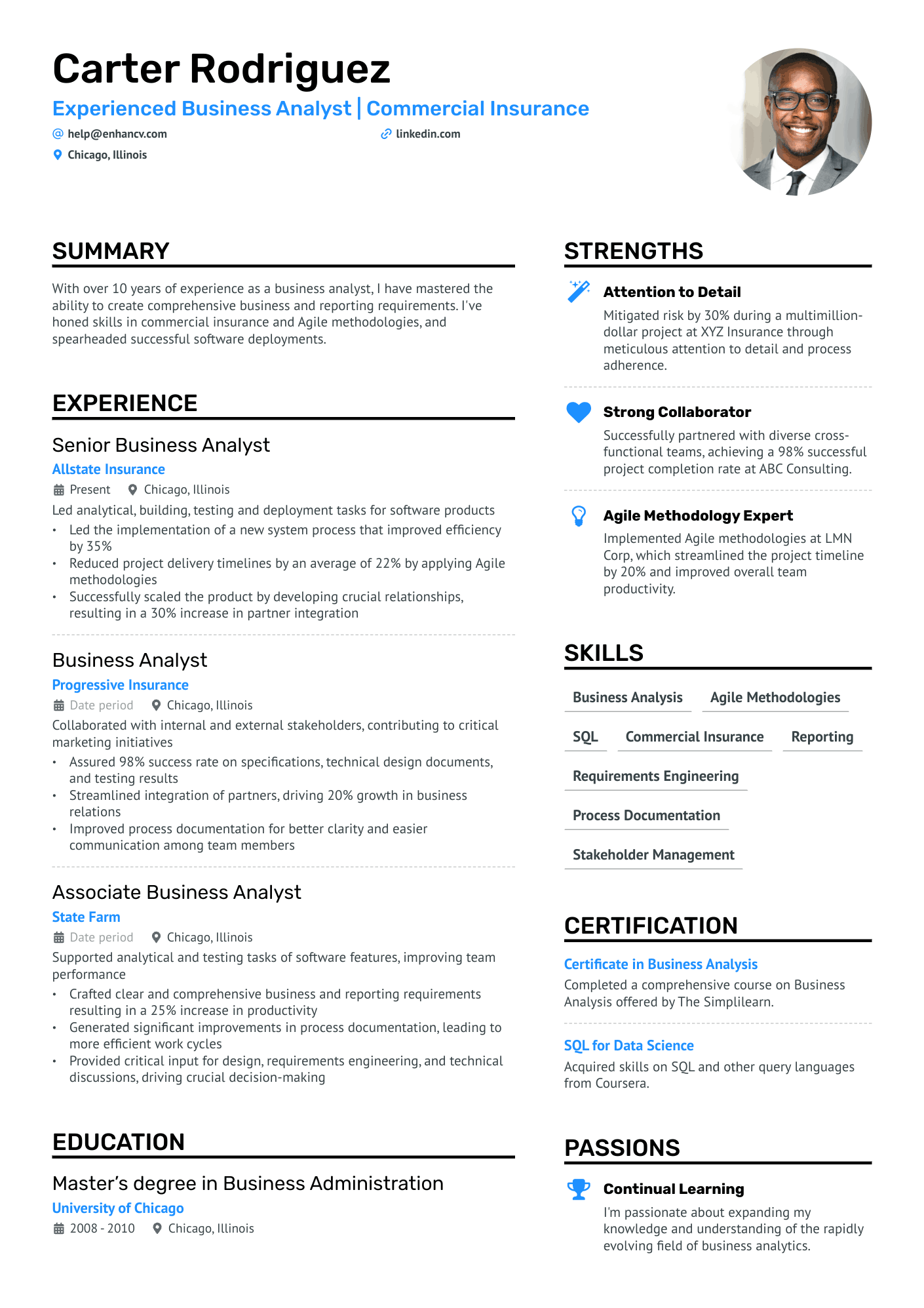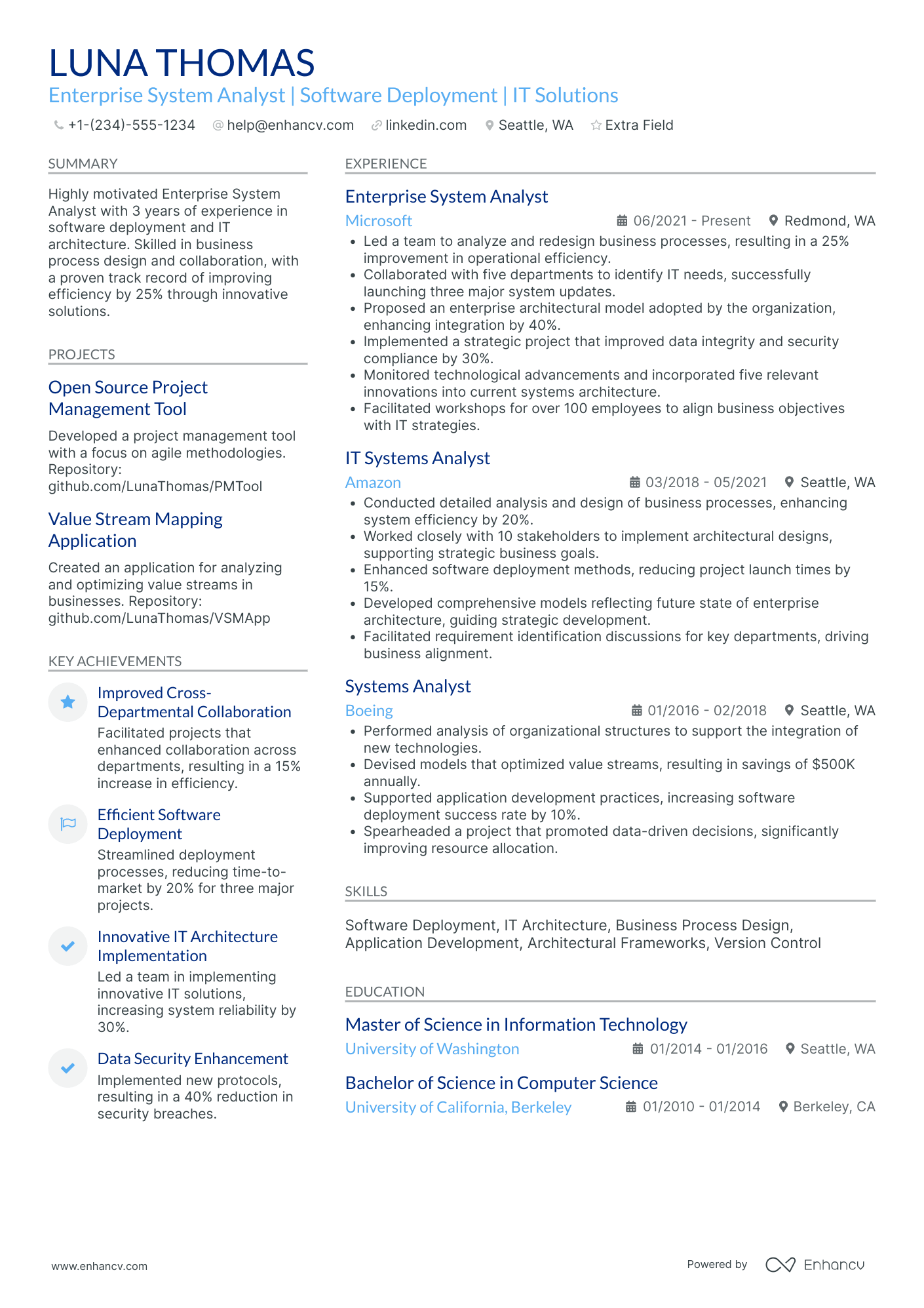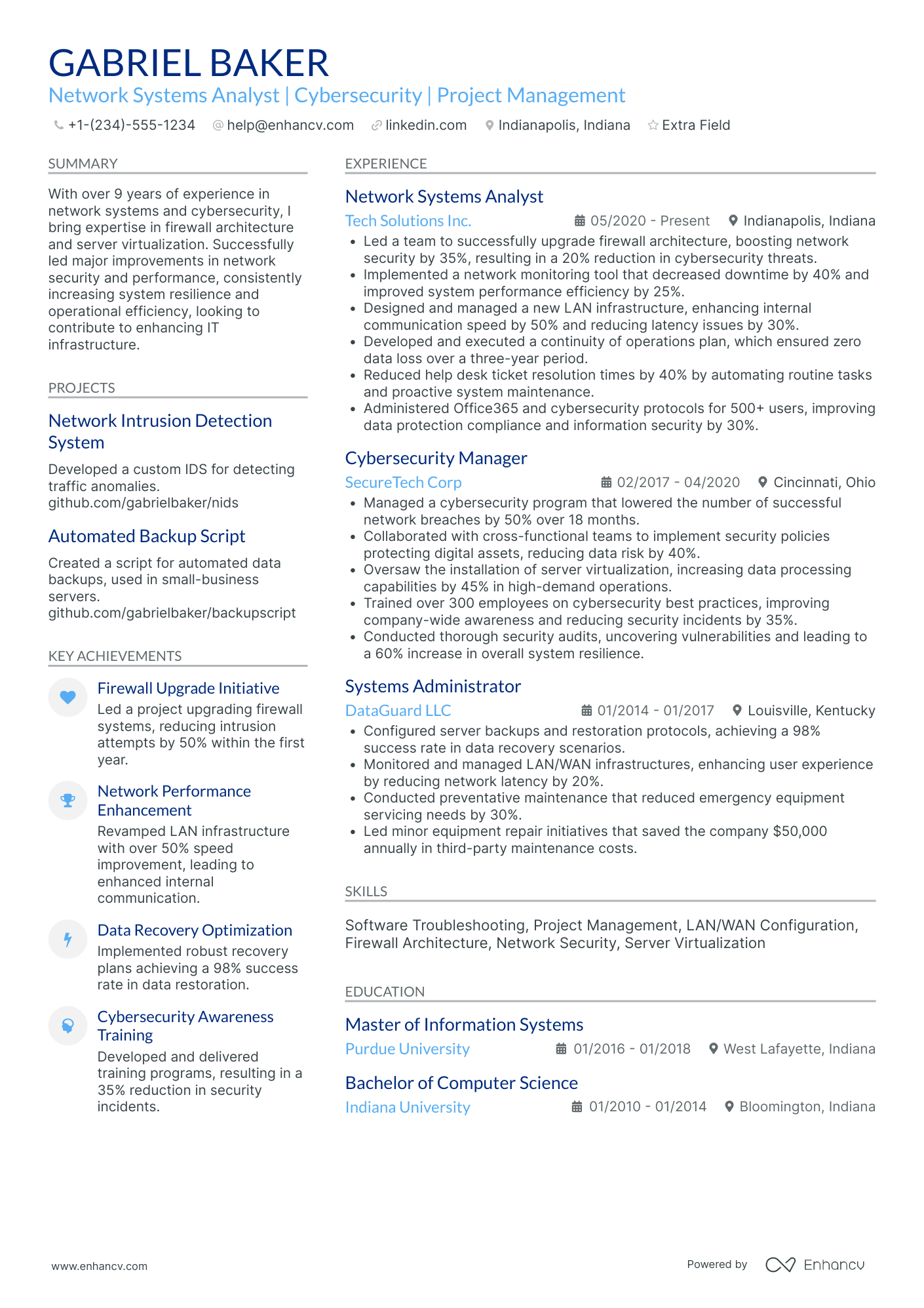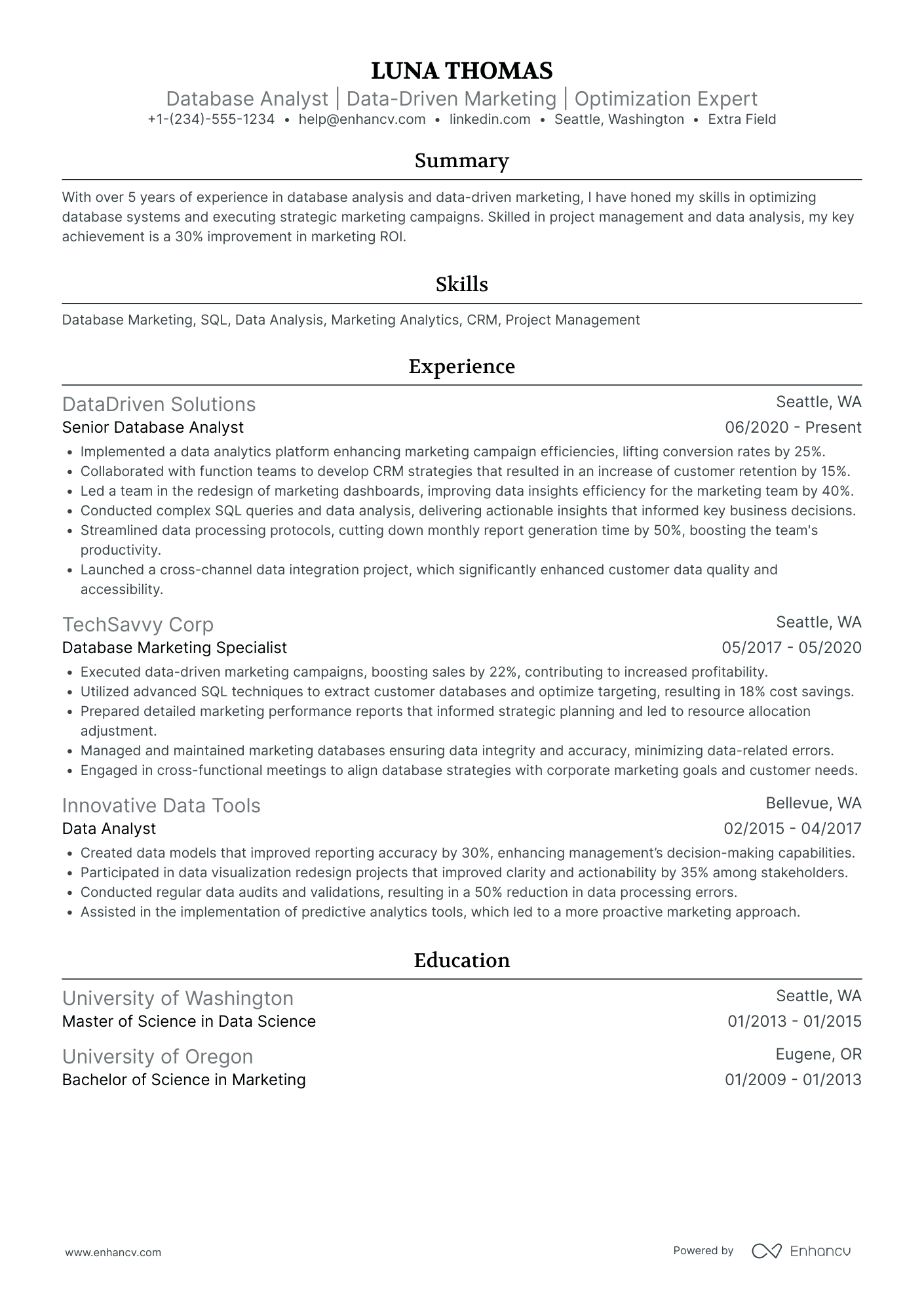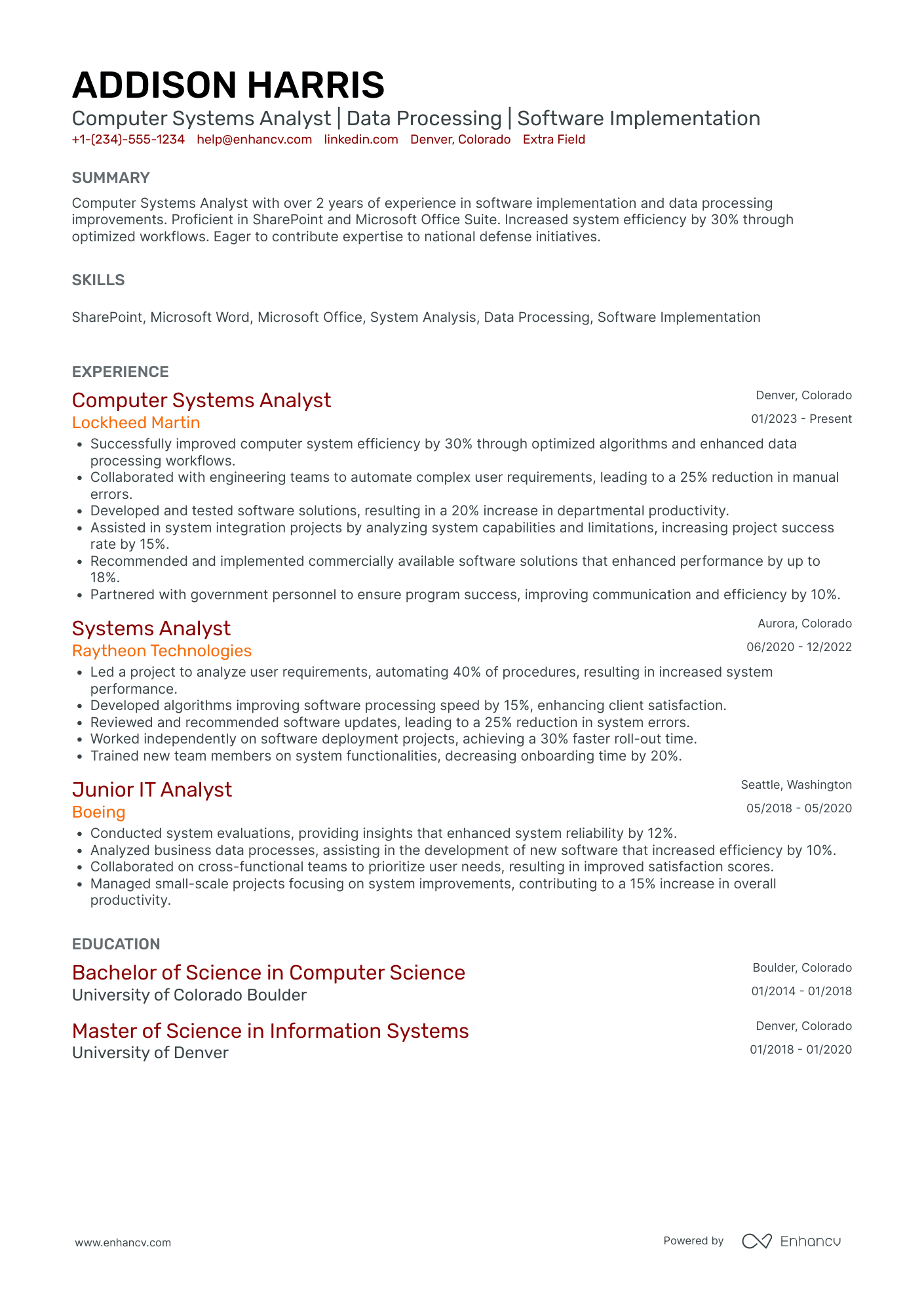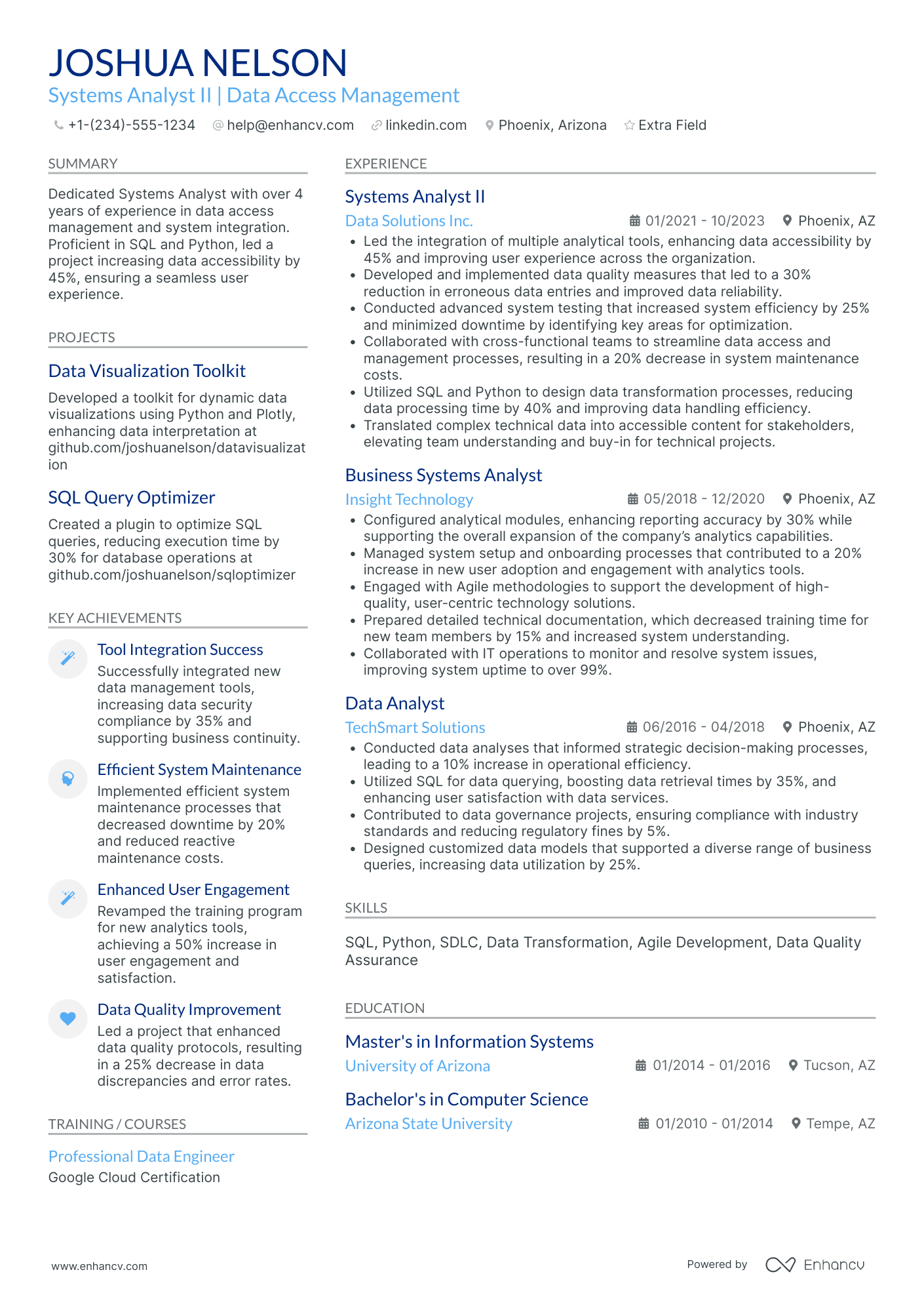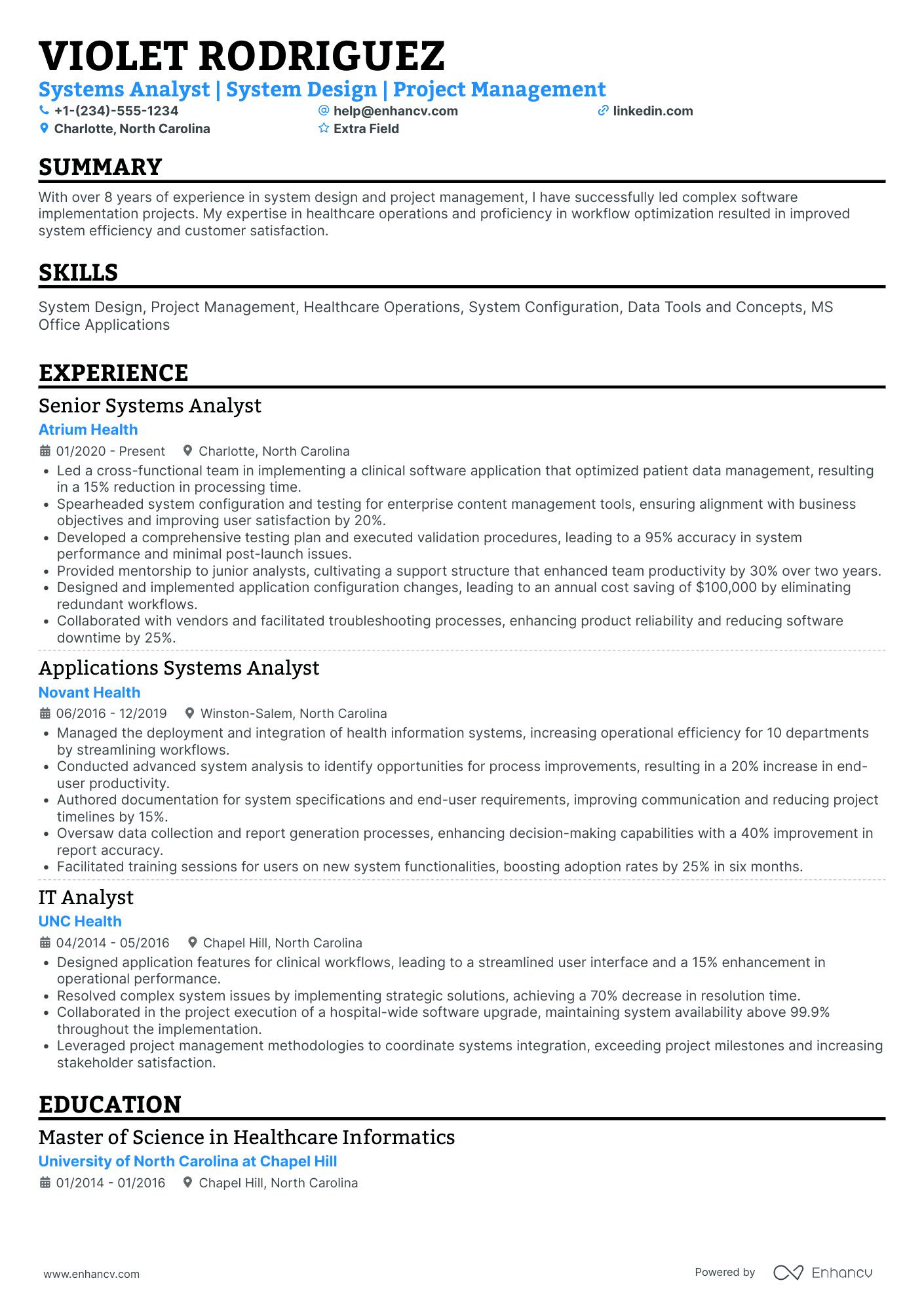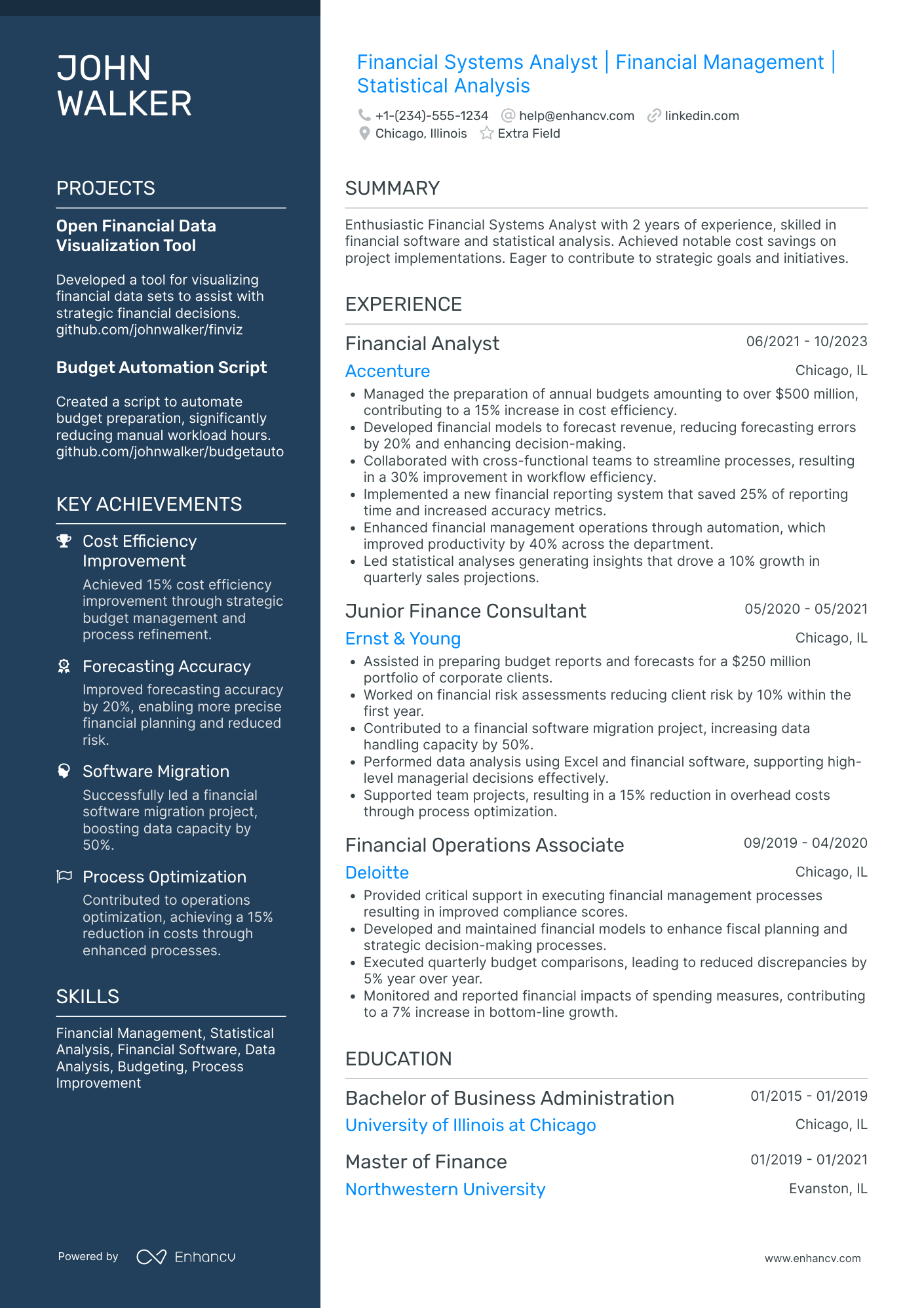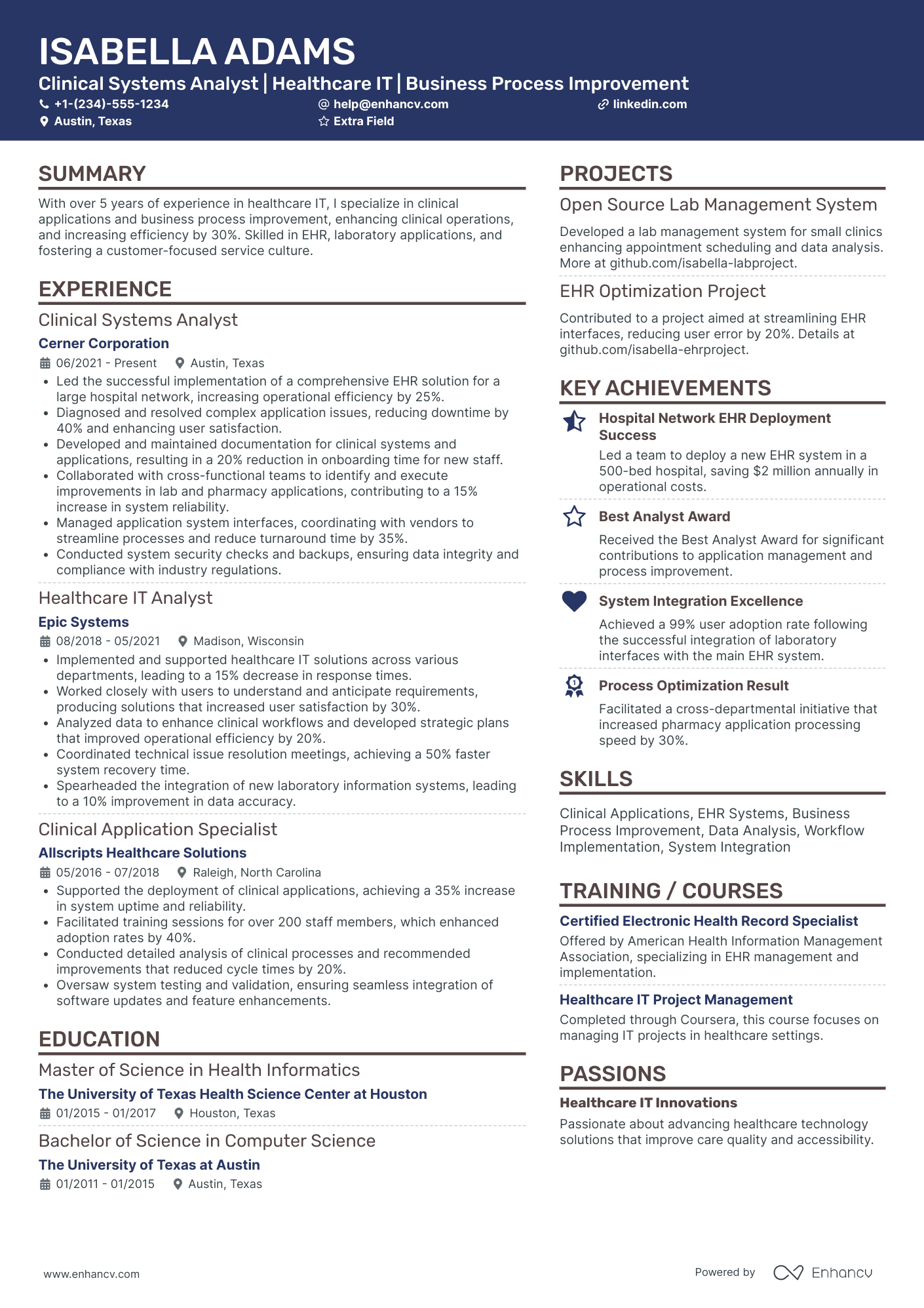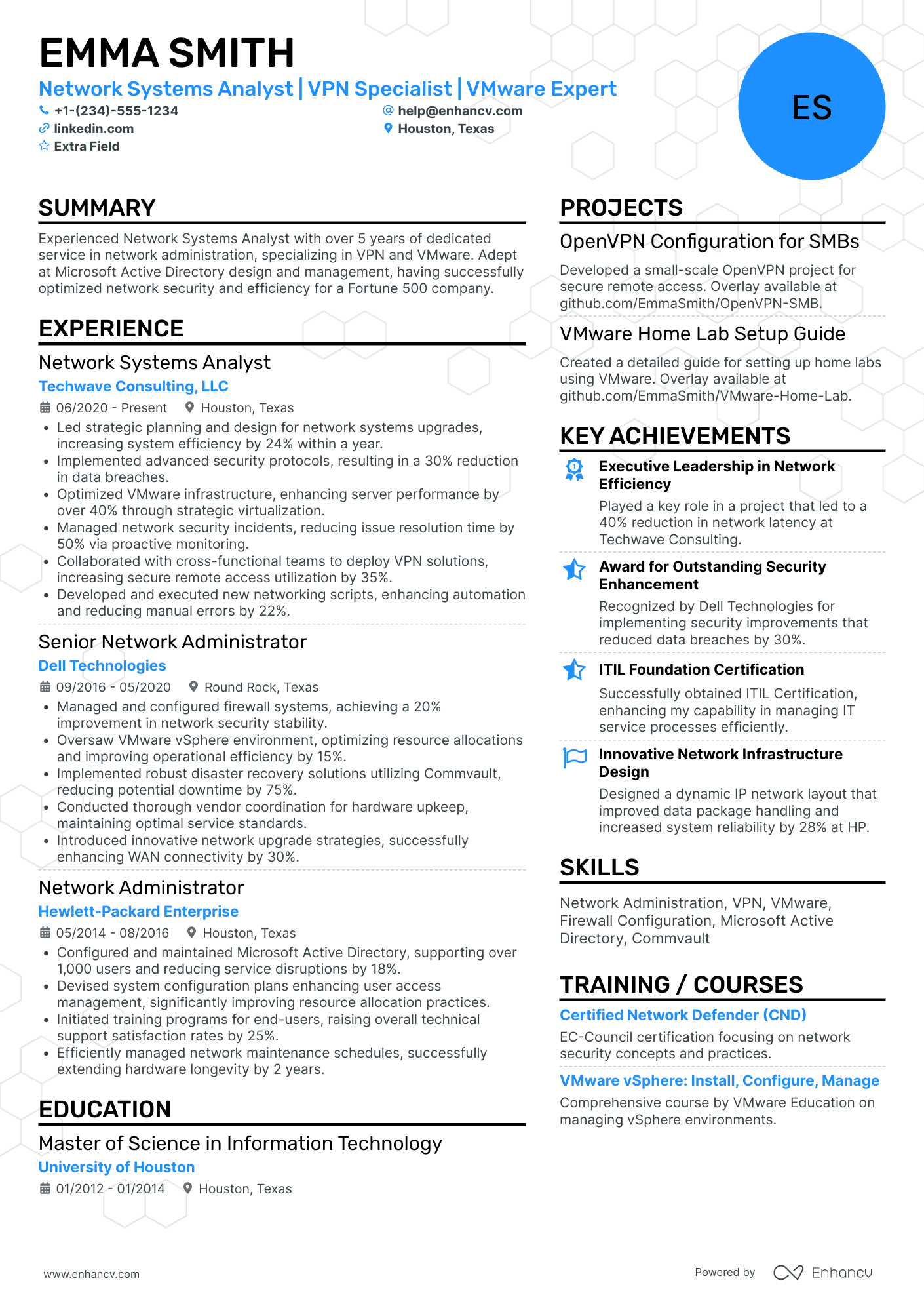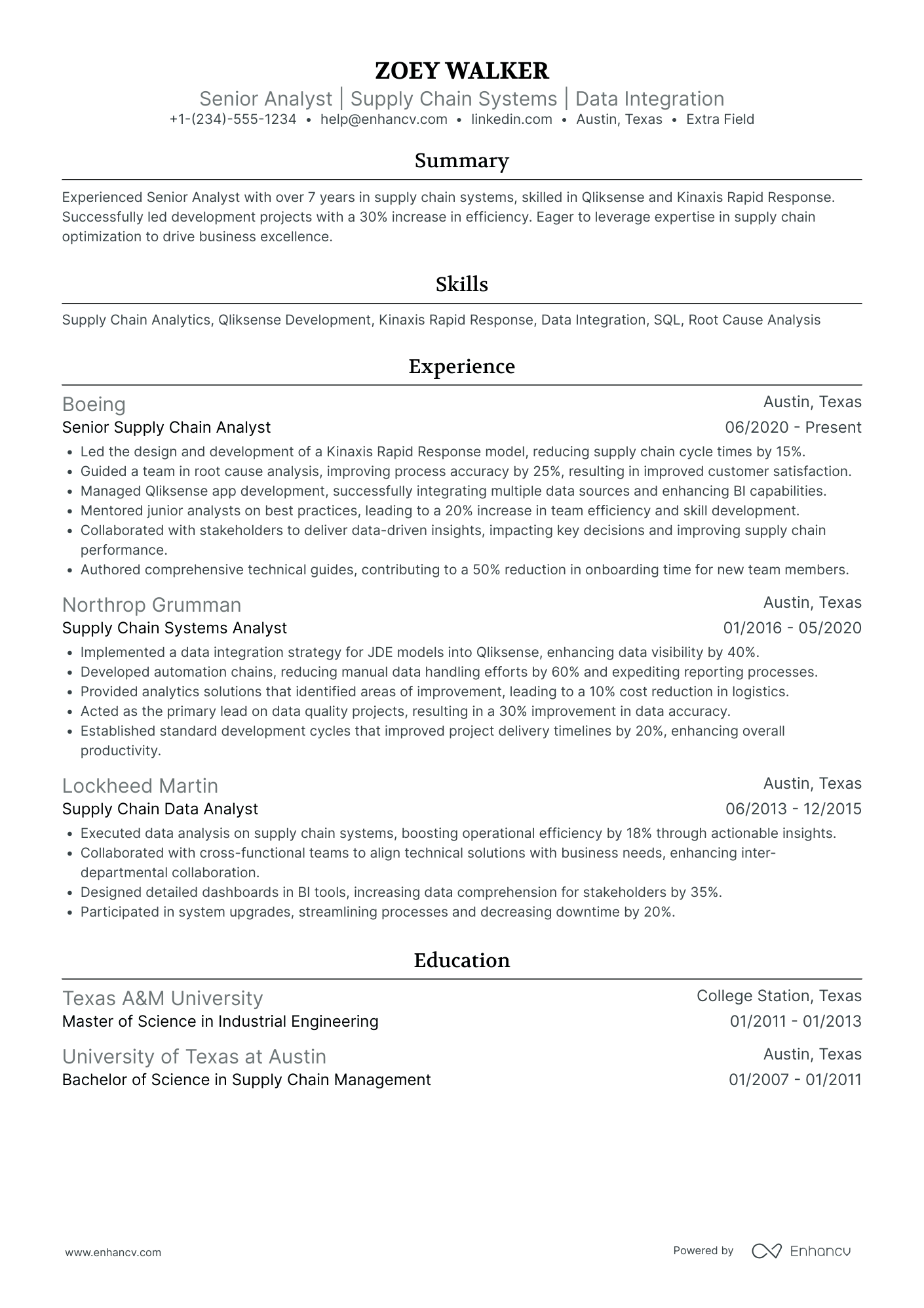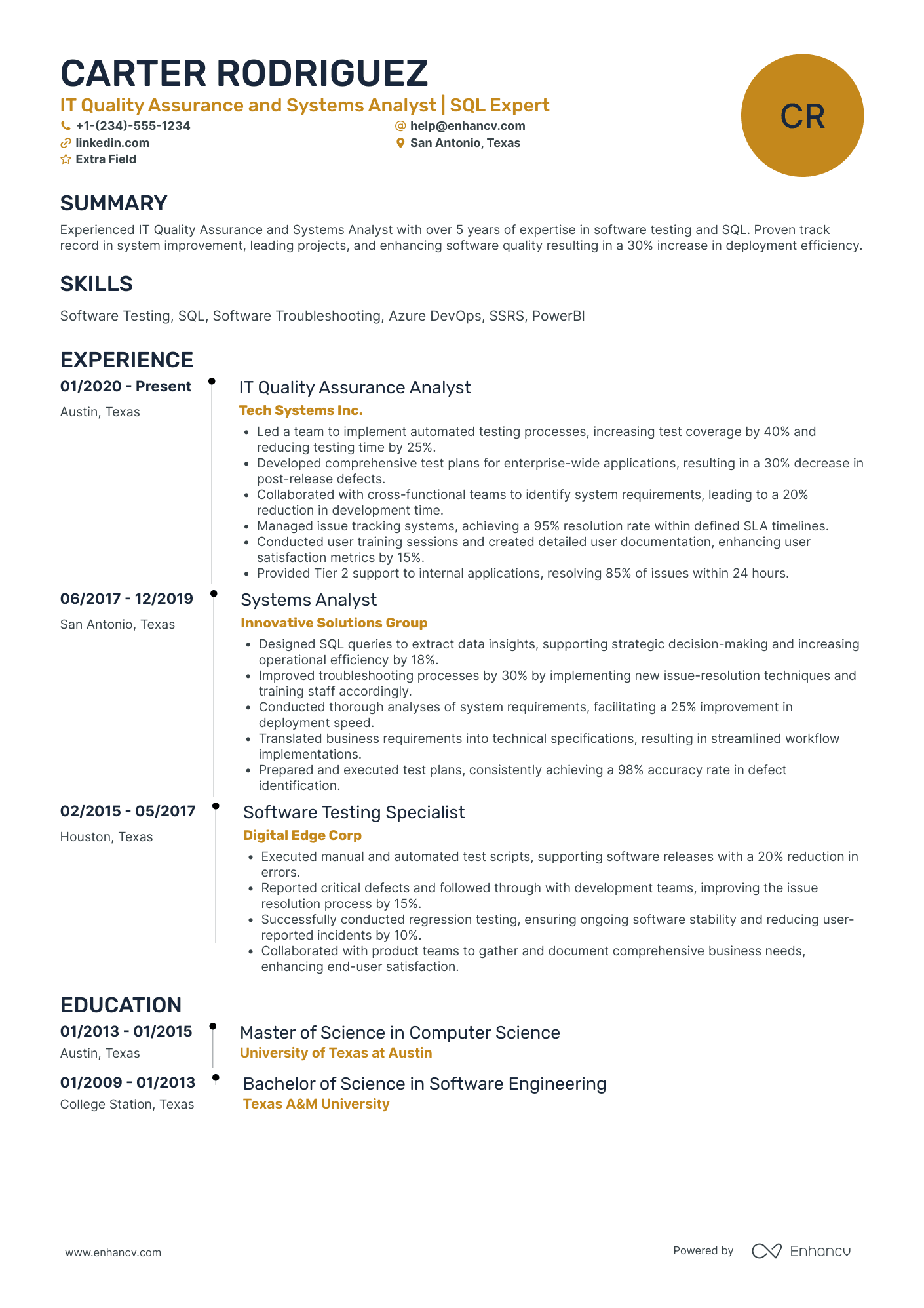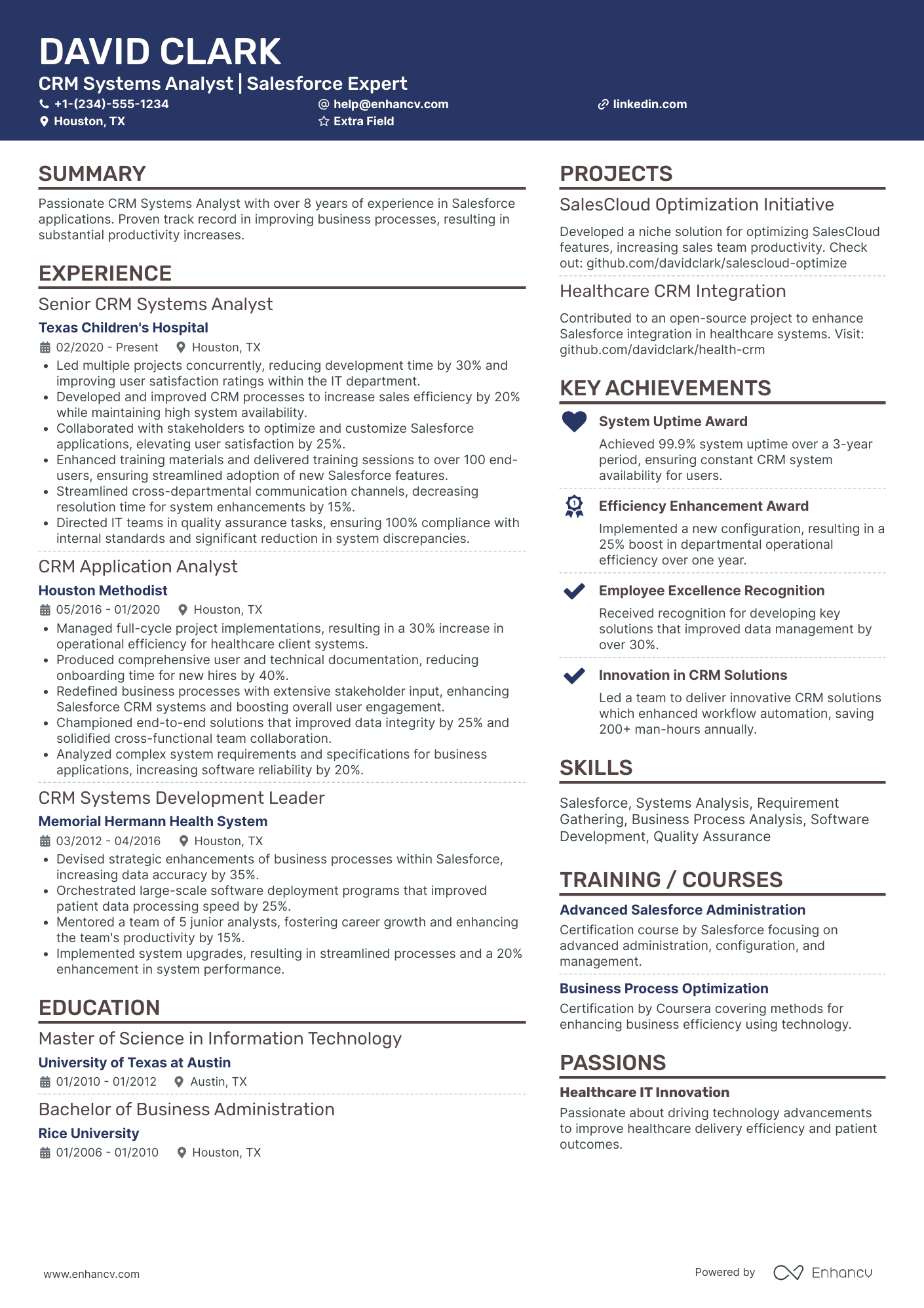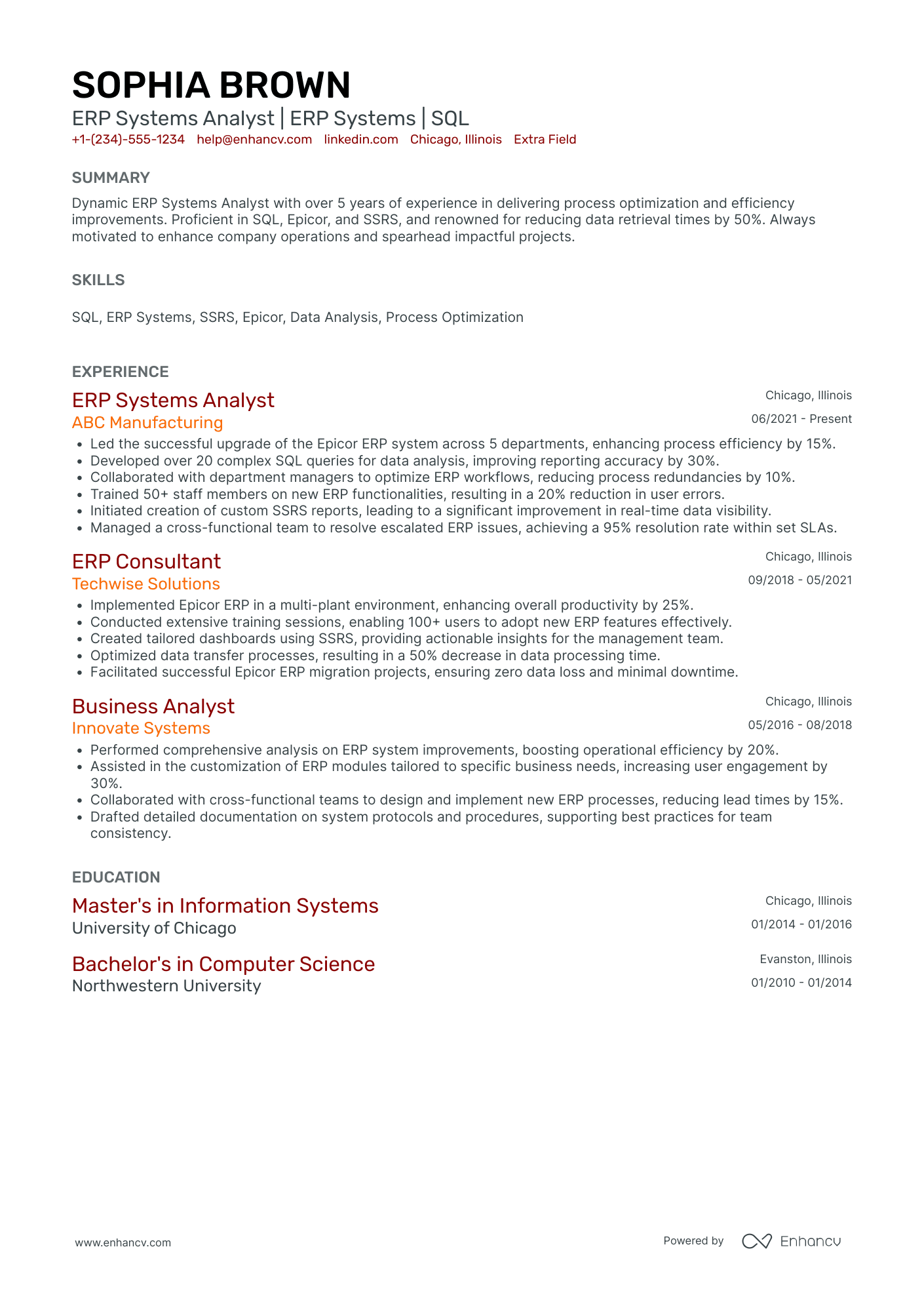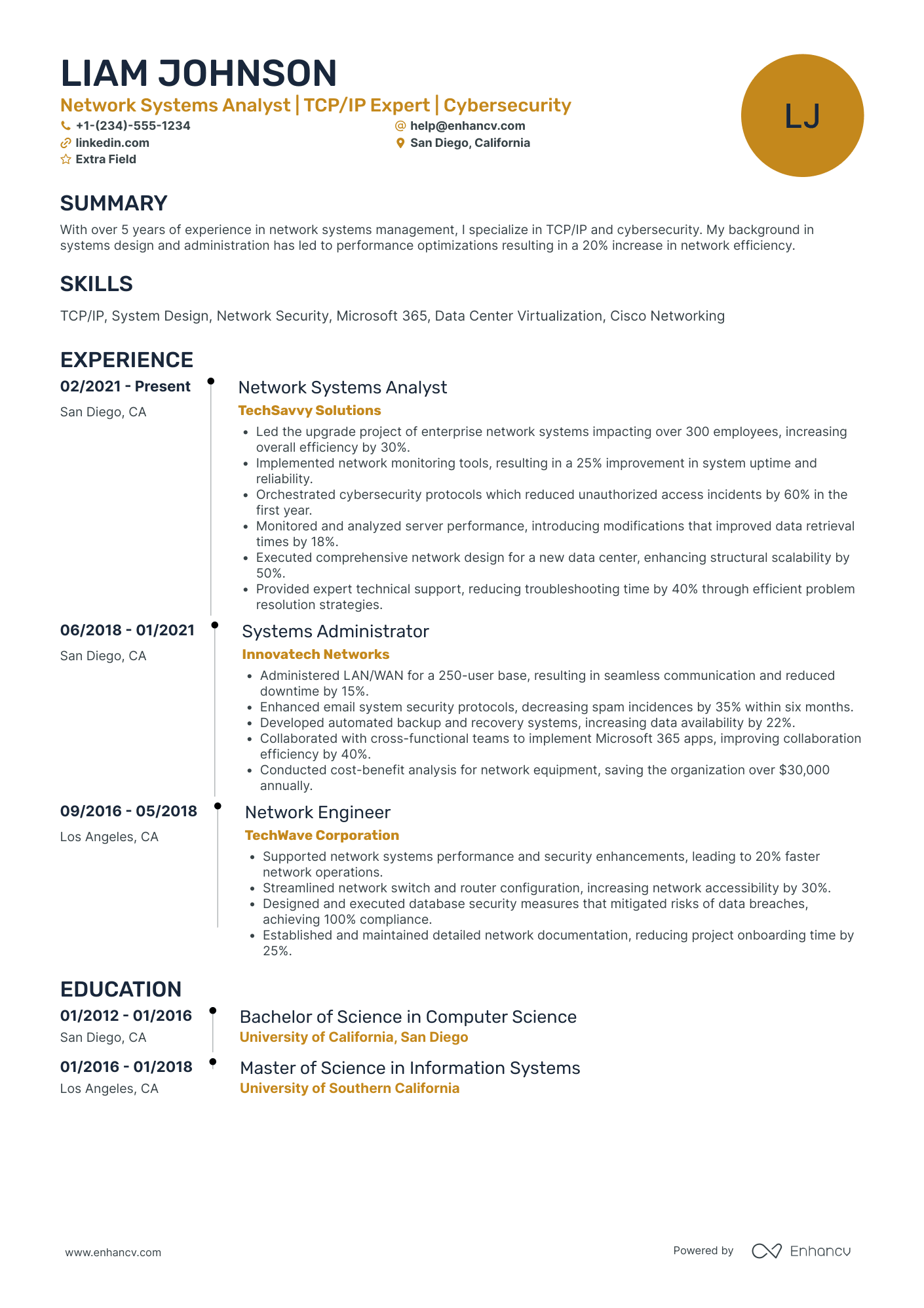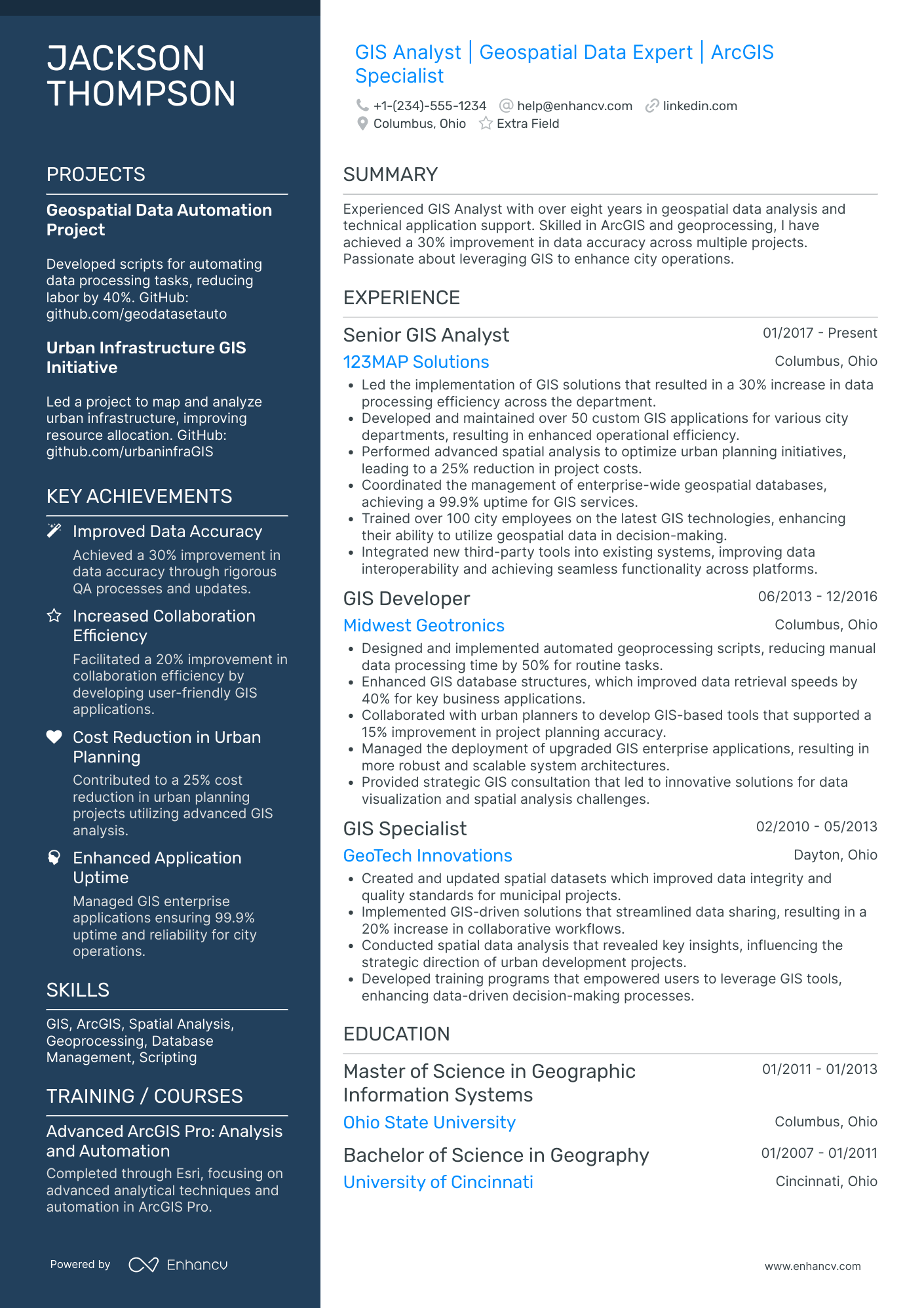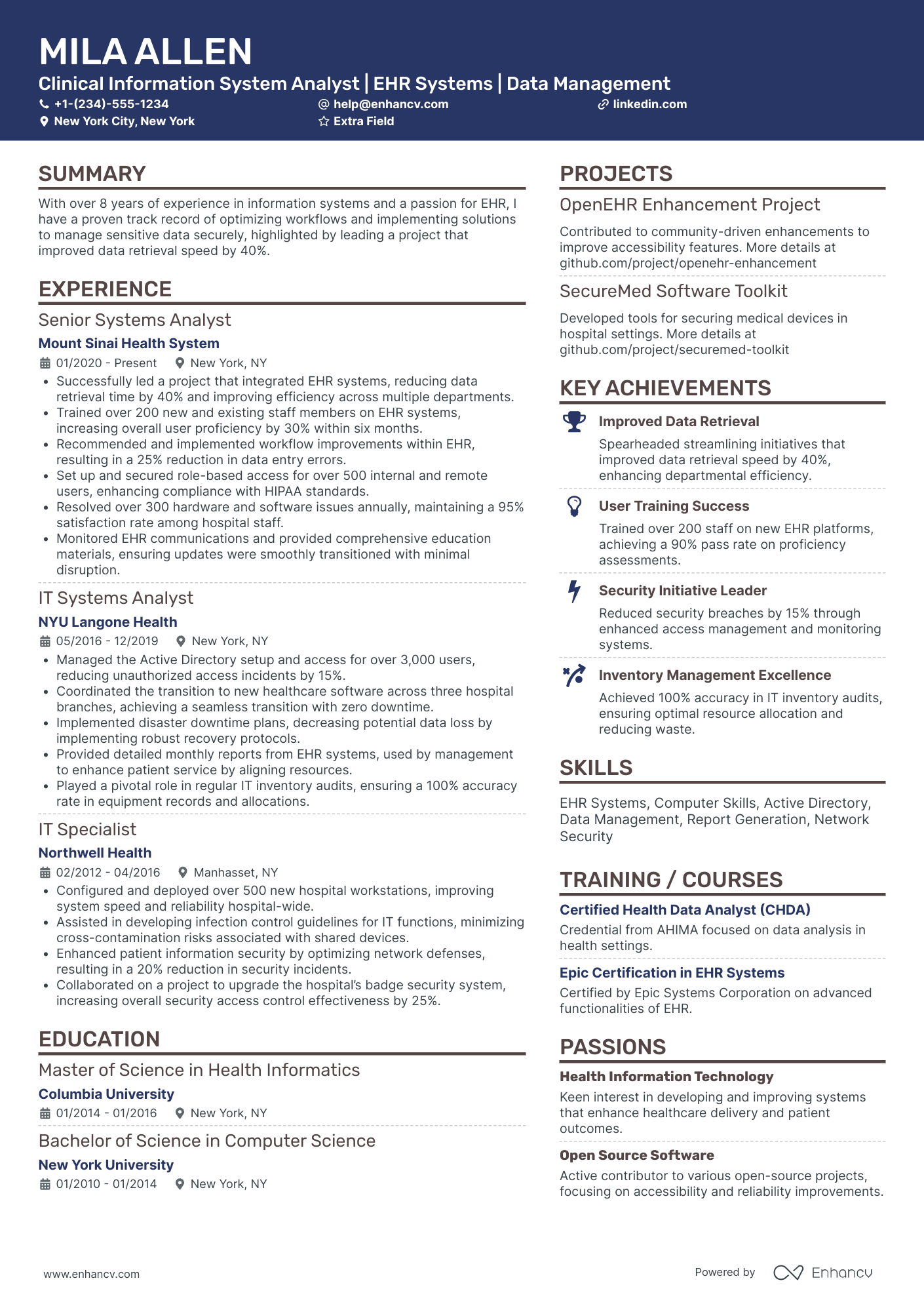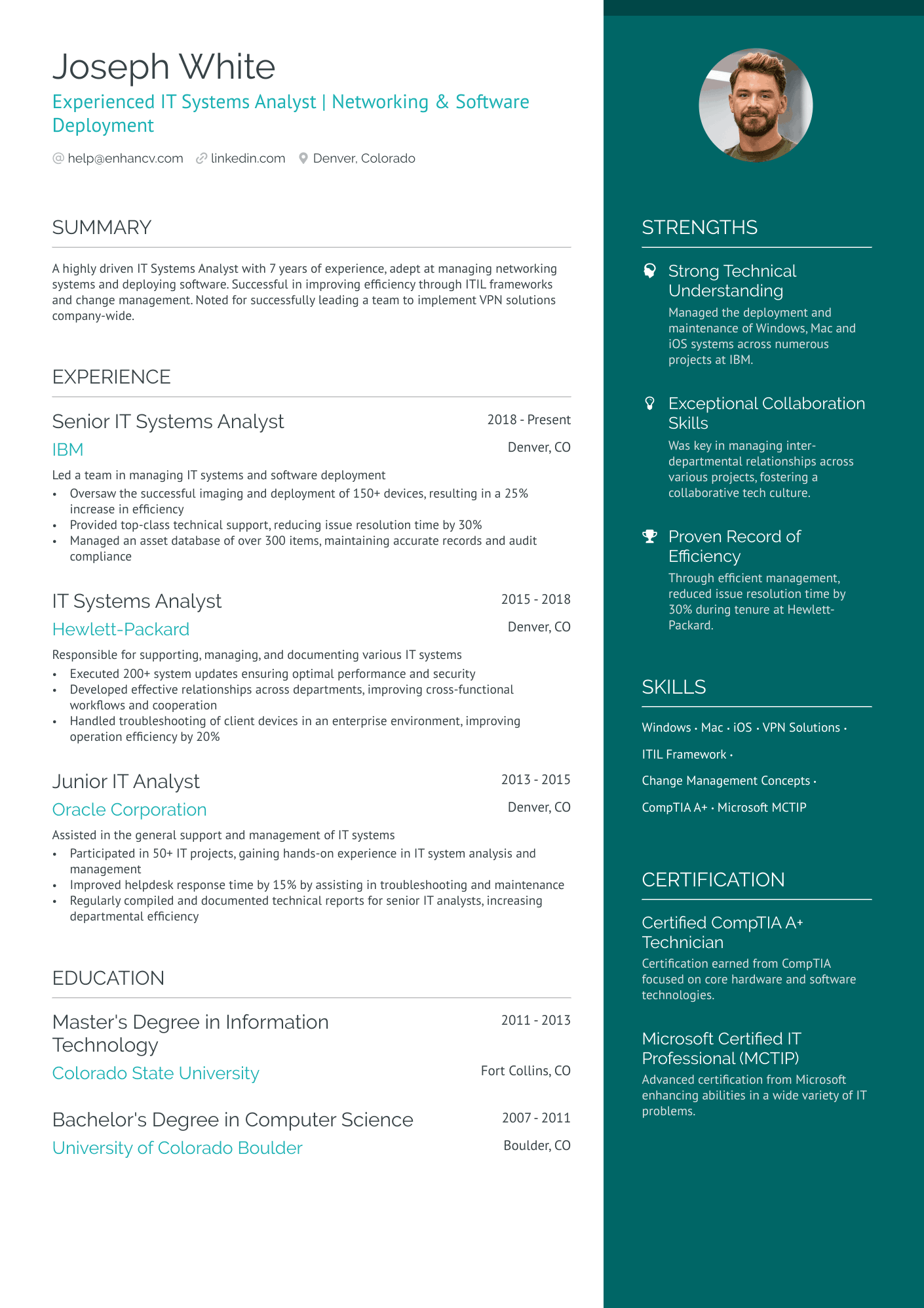As a system analyst, articulating your complex technical experiences and skills in an easily understandable format for recruiters can be a daunting resume challenge. Our guide provides clear strategies to help you distill your technical expertise into compelling, job-winning bullet points that resonate with employers.
- Utilize real-life examples to refine your system analyst resume;
- Effectively write the experience section of your system analyst resume, even if you have minimal or no professional experience;
- Incorporate the industry's top 10 essential skills throughout your resume;
- Include your education and certifications to highlight your specific expertise.
If the system analyst resume isn't the right one for you, take a look at other related guides we have:
- Software Tester Resume Example
- IT Infrastructure Project Manager Resume Example
- Database Developer Resume Example
- IT Security Manager Resume Example
- Aws Network Engineer Resume Example
- Angular Full Stack Developer Resume Example
- Application Engineer Resume Example
- Development Manager Resume Example
- Computer Technician Resume Example
- SAS Clinical Programmer Resume Example
How to style your system analyst resume: layout and format
When creating your system analyst resume, have you ever wondered how long it should be? Experts point out that it should be between one and two pages. Choose the longer format, if you happen to have over a decade of relevant experience. What is more, resume formats play a crucial role in presenting your experience. Use the:- Reverse-chronological resume format to highlight your experience;
- Functional skill-based resume format if you have less experience and want to focus on skills;
- Hybrid resume format to guide recruiters through both your experience and skills.
- Make sure your headline is simple and includes the job you're applying for or your current role, an abbreviation of a certificate you have, or even your professional area of interest;
- Always tailor your system analyst resume to the role you're applying for by matching job requirements to your experience via different resume sections;
- Once you've created your resume, download it in PDF (unless otherwise specified). This is to ensure readability and that the layout remains fixed.
Think about the market’s preferences – a Canadian resume, for instance, could have a different layout.
Upload & Check Your Resume
Drop your resume here or choose a file. PDF & DOCX only. Max 2MB file size.
PRO TIP
List all your relevant higher education degrees within your resume in reverse chronological order (starting with the latest). There are cases when your PhD in a particular field could help you stand apart from other candidates.
Traditional sections, appreciated by recruiters, for your system analyst resume:
- Clear and concise header with relevant links and contact details
- Summary or objective with precise snapshot of our career highlights and why you're a suitable candidate for the system analyst role
- Experience that goes into the nuts and bolts of your professional qualifications and success
- Skills section(-s) for more in-depth talent-alignment between job keywords and your own profile
- Education and certifications sections to further show your commitment for growth in the specific niche
What recruiters want to see on your resume:
- Extensive knowledge in system analysis methodologies and modeling techniques such as UML or BPMN.
- Proven experience with system development life cycle (SDLC) including requirements gathering, analysis, design, testing, and deployment.
- Proficiency in using data analysis tools like SQL, spreadsheets and business intelligence software.
- Demonstrated ability to document system requirements, process flow diagrams, and data mappings clearly.
- Strong communication skills to liaise between stakeholders, developers, and project managers, often including translating technical concepts to non-technical audiences.
Creating your system analyst resume experience to catch recruiters' attention
Remember that for the system analyst role, hiring managers are looking to see how your expertise aligns with their requirements. Here's where your resume experience section can help out. Make sure you:
- Include mainly roles that are relevant to the system analyst job you're applying for;
- Don't go too far back in your experience - recruiters will only care what you did a decade ago if it's really important for the system analyst role;
- Each bullet you include should say what you did, followed by the skills you used and the actual end result of your efforts;
- Quantify each of your achievements with numbers and possibly the overall effect it had on the organization;
- Highlight transferrable skills - or personal skills you've attained thanks to past jobs - that could be applicable within your potential workplace. This would showcase your unique value as a professional.
Formatting the experience section of your resume doesn't have to be an over-the-top deep dive into your whole career. Follow the system analyst resume examples below to see how industry-leading professionals are presenting their experience:
- Spearheaded a cross-functional team to redesign database schema, enhancing data retrieval efficiency by 35% for critical financial reporting.
- Developed and implemented a new automated testing framework that decreased system vulnerabilities by 25% through continuous integration and deployment practices.
- Led the migration of legacy systems to a modernized cloud-based platform, which reduced infrastructure costs by 20% and improved scalability for the company.
- Managed a portfolio of system enhancements which resulted in a 15% increase in user satisfaction across the sales and logistics departments.
- Piloted a business process modeling initiative that led to the optimization of workflow processes, shortening project delivery timelines by an average of 10 weeks.
- Collaborated with IT security to implement robust security protocols, resulting in a 40% reduction in incidents of data breaches.
- Orchestrated the successful rollout of a new ERP system, ensuring smooth transition and minimal downtime, thereby maintaining productivity levels during the transition phase.
- Authored comprehensive system documentation that improved knowledge transfer and reduced onboarding time for new analysts by 50%.
- Executed a cost-benefit analysis for proposed system changes, leading to informed decision-making and a 30% reduction in unnecessary IT spending.
- Streamlined data flow between the CRM and sales databases, massively boosting lead generation and tracking capabilities, doubling the conversion potential.
- Crafted user stories and acceptance criteria that effectively bridged the gap between business requirements and technical capabilities, ensuring deliverables met all end-user expectations.
- Analyzed and revamped the customer support ticketing process, improving resolution response times by 60%.
- Developed and deployed an automated resource allocation system that optimized workload distribution and led to a 20% increase in team productivity.
- Conducted a comprehensive systems evaluation which identified strategic areas for process automation, ultimately reducing manual input hours by 1,500 annually.
- Initiated and supervised a data analytics project that provided actionable insights, enhancing product development strategies.
- Championed the development and adoption of an internal collaboration tool that connected over 5,000 employees, enhancing inter-departmental communication and efficiency.
- Facilitated comprehensive system audits which led to the identification and resolution of critical bottlenecks, slashing system downtime by 80%.
- Drove the automation of key compliance reporting features, ensuring regulatory adherence while saving 300 man-hours annually.
- Directed a team to integrate multi-factor authentication across company apps, significantly improving data security and user confidence.
- Pioneered the adoption of machine learning algorithms within the company's product recommendation systems, boosting average order value by 15%.
- Liaised with stakeholders to translate complex business needs into technical specifications, propelling the launch of a customer-centric mobile application.
- Contributed to the delivery of a comprehensive upgrade to the company’s billing system that improved invoice accuracy and reduced payment disputes by 30%.
- Implemented a real-time monitoring solution for network performance that reduced system outages and improved average uptime to 99.9%.
- Assisted in conducting user acceptance testing for new software features, ensuring seamless deployment and a 95% customer satisfaction rate.
Quantifying impact on your resume
- Detail how you have improved system efficiencies, specifying the percentage increase in performance.
- Quantify the cost savings achieved through system optimizations or new implementations.
- Document the number of projects led or completed on time and within budget.
- Highlight any reductions in system downtime by mentioning the exact percentage of improvement.
- Mention the scale of the systems you have analyzed or upgraded, including numbers of users supported or transactions processed.
- Describe how you streamlined processes, indicating the amount of time saved.
- List any increases in customer satisfaction scores or service levels under your system improvements.
- Specify the volume of data you manage or analyze regularly to demonstrate your familiarity with large-scale systems.
Action verbs for your system analyst resume
What to do if you don't have any experience
It's quite often that candidates without relevant work experience apply for a more entry-level role - and they end up getting hired.
Candidate resumes without experience have these four elements in common:
- Instead of listing their experience in reverse-chronological format (starting with the latest), they've selected a functional-skill-based format. In that way, system analyst resumes become more focused on strengths and skills
- Transferrable skills - or ones obtained thanks to work and life experience - have become the core of the resume
- Within the objective, you'd find career achievements, the reason behind the application, and the unique value the candidate brings about to the specific role
- Candidate skills are selected to cover basic requirements, but also show any niche expertise.
Recommended reads:
PRO TIP
If you happen to have some basic certificates, don't invest too much of your system analyst resume real estate in them. Instead, list them within the skills section or as part of your relevant experience. This way you'd ensure you meet all job requirements while dedicating your certificates to only the most in-demand certification across the industry.
The right balance between hard skills and soft skills for your system analyst resume
Wondering what the perfect system analyst resume looks like? The candidate's profile meets job requirements by balancing both hard skills and soft skills across their resume.
- Hard skills are all the technologies you're apt at using . Prove you have the right technical background by listing key industry hardware/software in your system analyst resume skills section and noteworthy certifications.
- Soft skills are both your personal, mindset, communication, analytical, and problem-solving talents . Use your system analyst resume achievements section to show how you've used a particular soft skill to reach a tangible outcome.
When writing about your unique skill set, always make sure to refer back to the job advert to see what are the key requirements. This ensures you've tailored your resume so that it matches closer to what the ideal candidate profile is.
Top skills for your system analyst resume:
SQL
Python
Java
Data Analysis Tools
Business Process Modeling
UML
Requirements Gathering
System Design
Project Management Software
Data Visualization Tools
Problem Solving
Critical Thinking
Communication
Team Collaboration
Adaptability
Attention to Detail
Time Management
Analytical Thinking
Conflict Resolution
Stakeholder Management
PRO TIP
If you're in the process of obtaining your certificate or degree, list the expected date you're supposed to graduate or be certified.
The system analyst resume sections you may underestimate: certifications and education
Your education and certifications provide insight into both your technical capabilities and personal attributes, such as perseverance. When crafting your system analyst resume, consider how you present these elements:
- For your higher education degrees, prioritize listing those most relevant to the job or indicative of your academic dedication;
- Include applicable coursework as a stand-in for relevant experience or if it might impress recruiters;
- Include incomplete higher education only if it's pertinent to meeting job requirements;
- If your degree is from a renowned university, mention how often you made the Dean's list to underline academic excellence.
Regarding certifications, it's not necessary to list all of them. Instead, match up to three of your most recent or significant certificates with the technical skills required in the job description.
Below, we've selected some of the top industry certifications that could be vital additions to your system analyst resume.
The top 5 certifications for your system analyst resume:
- Certified Information Systems Analyst (CISA) - ISACA
- Certified Software Development Professional (CSDP) - IEEE Computer Society
- Microsoft Certified: Azure Data Fundamentals (DP-900) - Microsoft
- Professional in Business Analysis (PBA) - Project Management Institute
- Certified Business Analysis Professional (CBAP) - International Institute of Business Analysis
PRO TIP
Always remember that your system analyst certifications can be quantified across different resume sections, like your experience, summary, or objective. For example, you could include concise details within the expertise bullets of how the specific certificate has improved your on-the-job performance.
Recommended reads:
The summary or objective: focusing on the top one-third of your resume
It's a well-known fact that the top one-third of your system analyst resume is the make-it-or-break-it moment of your application. The resume summary and objective could help you further build up your professional profile.
- If you have plenty of career highlights behind your back, use the resume summary . The system analyst summary immediately focuses recruiters' attention on what matters most within your experience.
- The resume objective is the perfect choice for balancing your career achievements with your vision. Use it to state precisely how you see yourself in a couple of years' time - as part of the company you're applying for.
Both the resume summary and resume objective can be your value pitch to potential employers: answering what makes your application unique and the top choice for the system analyst role. They both have to be specific and tailored - as there's no one-size-fits-all approach to writing your system analyst summary or objective. Use the system analyst examples below as a starting point:
Resume summaries for a system analyst job
- With over 5 years of experience in system analysis at a Fortune 500 tech company, I have a proven track record in enhancing system efficiency by 30%. Expert in requirement gathering, SQL, and Agile methodology, I’m driven to leverage my analytical skills and technical knowledge to drive impactful changes in complex IT environments.
- Former financial analyst with 3 years of experience transitioning into system analysis. Bringing a strong background in data analysis, Python programming, and experience with financial modeling tools. I led a team that successfully automated quarterly financial reporting, saving 200 hours annually, showcasing my potential to bridge business and technology.
- Experienced software developer for 7 years, seeking to apply my coding skills and project management experience to system analysis. I have a solid understanding of Java, C++, and database design and was instrumental in developing an award-winning mobile application used by over 1 million users.
- Seeking to contribute my enthusiasm for technology and problem-solving abilities as a budding system analyst. Although new to the field, I'm equipped with a relevant degree in Computer Science and hands-on internship experience that included data flow diagram creation, which aligns well with the foundational requirements of system analysis.
- Adept in conducting thorough system studies and translating business requirements into technical solutions, I’ve dedicated 8 years to system analysis within the healthcare sector. I’ve successfully implemented an EHR system that improved patient care delivery for a network of hospitals and am skilled in HL7, data privacy, and cross-functional team leadership.
- Eager to launch a career in system analysis, where I can apply my fresh knowledge from a Master’s in Information Systems and my passion for optimizing technological frameworks. My objective is to contribute to the success of technology projects by ensuring that system specifications align perfectly with strategic business objectives.
Showcasing your personality with these four system analyst resume sections
Enhance your system analyst expertise with additional resume sections that spotlight both your professional skills and personal traits. Choose options that not only present you in a professional light but also reveal why colleagues enjoy working with you:
- My time - a pie chart infographic detailing your daily personal and professional priorities, showcasing a blend of hard and soft skills;
- Hobbies and interests - share your engagement in sports, fandoms, or other interests, whether in your local community or during personal time;
- Quotes - what motivates and inspires you as a professional;
- Books - indicating your reading and comprehension skills, a definite plus for employers, particularly when your reading interests align with your professional field.
Key takeaways
Securing your ideal job starts with crafting a compelling system analyst resume. It should not only highlight your professional strengths but also reflect your personality. Key aspects to remember include:
- Choose a clear, easily editable format, allowing more time to focus on the content of your resume;
- Emphasize experience relevant to the job, focusing on your impact on the team;
- Opt for a resume summary if you have extensive professional experience, and a resume objective if you're just starting out;
- Include technical skills in the skills section and interpersonal skills in the achievements section;
- Recognize the importance of various resume sections (e.g., My Time, Projects) in showcasing both your professional abilities and personal traits.
System Analyst resume examples
By Experience
Entry Level System Analyst
Senior System Analyst
Junior System Analyst
Lead System Analyst
By Role
